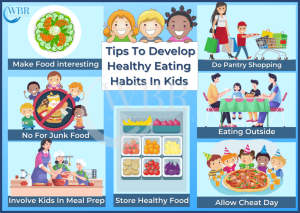Healthy eating for our children is becoming a major trend among the parents. Nonetheless, children being obese has become a global concern for parents and others. Several factors contribute to the issue of increasing obesity among children. Unhealthy lifestyle and poor dietary choices contribute a great deal to child obesity. Growing up, parents introduce children at very early to processed food and soft drinks. Both are high in salt and sugar. When these children start school, schools mostly outsource mid-day meals and tiffin from third parties. This food barely contains nutritional intake.
The situation is not different in developing countries even. The Bangladesh Demographic and Health Survey 2022 showed that about 50% of children (6–23 months) eat food that contains high salt and sugar. The transition from traditional homemade food to processed fast food is completely harmful to young health. It is directly impacting their not only physical health and growth negatively; their ability to learn, and mental enhancement is severely damaged in the long run. Their dietary food habits become distorted for life.
A study report published in the Lancet in 2022 shows that over 1 billion people are living with obesity; 159 million of them are children. This alarming scenario promptly requires national and international level action to identify the cause and solution of this problem soon.
How to Initiate Healthy Eating
As nutritionists suggest, there are different levels of calorie intake for each age range, sex, and activity level. A wide range of food diversity should be in the dietary habit to meet calorie and nutrient requirement. Five food groups are recommended for a balanced diet which are vegetables, fruit, cereals, poultry, and dairy products. Parents must stay careful about sugar or food additives-based beverages and sweets. To initiate healthy eating, ensure that food menu contains the food intakes below:
- Eat lots of veggies and fruits.
- Take one egg and drink a glass of milk every day.
- Grains and starch, less processed.
- Plenty and plenty of water.
A daily routine for timely eating is essential in this case. Parents should make sure that children have their breakfast in the morning and two other major meals at noon and evening. Thereafter, Fruits, nuts, and homemade snacks can be given at times considering their nutrient need and age. Experts say parents can encourage children eating healthy food by eating together at least once a day. As children loving copying their parents, eating with the children can help them grow similar food habits as their parents. Likely, dietitian Dr. Fink states that staying in a healthy family altogether is important. he said, that if one expects healthy habits from their children, then he/she too needs to practice those habits as a parent. Thus, only a healthy person eating healthy can ensure their own children’s healthy eating and stay healthy.
Where They Can Practice Healthy Eating?
Parents and teachers should acknowledge the problem and work to help children get rid of this. Parents are the mere operator here. A parent is the first good guide a child has initially. Parents should prioritize healthier options for children and encourage them to exercise. For example, a child will not have a craving for chocolate unless he/she is familiar with it.

Image: Wellness by Rose[1]
School meals can play a vital role in practicing healthy eating as young and adolescents spend long hours at school. If schools can monitor the food menu to ensure necessary nutritional intake, children will slowly lean to eat this kind of food. Schools in Korea and Japan become idols to the world for their school lunch programs. The motto for this was a movement that expanded in 1952 called “Consume Local Agriculture”. The consumed food is always freshly produced at local firms and seasonal mostly. The school authority prepares the lunch menu following nutritional guidelines that include starches, grains, beans, oil, and fats, especially besides other types. In addition, school authority ensures healthy cooking methods as well. The result is breathtaking. Japan has the lowest child obesity rate as per government data. As a matter of price, many news reports and documentaries have featured this school intervention for other countries.
Parents and Government as Change Makers
Some people demand that the government should take action to resolve this problem. Government is one prominent actor in treating this raising concerns world-wide. Concerned parents are rushing to doctors and dietitians for advices yet the scenario depicts no significant change.
Nonetheless, governments of some countries are coming forward to tackle this issue. For example, the American federal government has planned to testify about the components of packet food to check whether the claims the food companies make about nutritious components in their adverts are true. Besides, the government can also investigate what sort of food adverts schools exhibit within their premises and whether they are suitable ones. Laws can be enacted to ensure marketing of junk foods containing harmful ingredients for children will be strongly monitored.
Tudors Adhanom Ghebreyesus, director-general of WHO also calls for the governments, communities, and other public health agencies to come forward with evidevidence-basedicies and action plans to keep obesity in check worldwide. He signifies the cooperation of the food industries in taking accountability for the negative impact their processed food has on children.
To sum up, in agreement with some people that government needs to act on this, I believe that parents are also in partnership with the government to resolution. Moreover, parents must act upon sincere determination to have healthier children.























